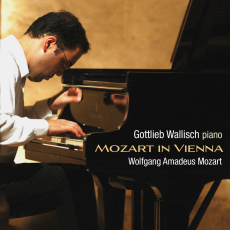Gottlieb Wallisch - Mozart in Vienna - Audio Video Club of Atlanta
There's a lot to like about "Mozart in Vienna," a selection of some of Mozart's best piano works, performed with rare insight and sensitivity of touch by the outstanding young Austrian pianist Gottlieb Wallisch (b. Vienna, 1978). In this program Wallisch shows a clear, broad view of the works he plays, giving his playing a transparent quality that allows us to experience their lithe but strong formal design and the luminous quality of Mozart's harmonies. He has an unusual sensitivity for the relative importance of the musical lines in a complex structure, something the finely shaded dynamic range of his playing helps to bring out time and again.
That's particularly important when considering the last two Piano Sonatas in B-flay Major, K570 and D Major, K576. Both were written at a time when composers such as Mozart were striving to reconcile the contrapuntal technique of the old masters with the contemporary "gallant" style, in the process setting the groundwork for the modern sonata-form that would dominate western music for decades. Both sonatas share the same formal layout: Allegro / Adagio / Allegretto. But here the resemblance ends, as K570 is the more formally severe of the two, the high drama of the outer movements being strongly contrasted to the exquisitely tender vision of a better world that we get in the Adagio.
The contrasts are defter, subtler in K576, which Mozart described (incredibly) in a letter to a friend as an "easy sonata" for Princess Friederike of Prussia. In common with the three "King of Prussia" Quartets that he was engaged in writing for her father, there's a great deal of contrapuntal muscle in this work, something Mozart sublimates under the smoothness of the surface. Wallisch has a nice equilibrium between his hands that helps to bring out the balance in this work, and he underscores its subtle coloration without overstating it. Not as carefree as other accounts I've heard of this work, Wallisch's interpretation of K576 compliments his K570 to perfection.
The other works are also superbly interpreted by Wallisch. They include the tenderly expressive Fantasia in D Minor, K397, which unfolds before us like a scena from an opera presented with wonderful spontaneity, and the remarkable Rondo in A Minor, K511, which Wallisch describes as "an intimate piece of chamber music for solo piano, full of melancholy, poetry and confession." As in his account of the Fantasia, Wallisch shows himself adept in exploring the patterns of light and shadow that make this work so intriguing. Wallisch concludes on a high note with the Variations in G Major, K455 on the aria "Unser dummer pöbel meint" from a comic opera by Gluck, an outrageous example of Mozart's musical humor at work.

